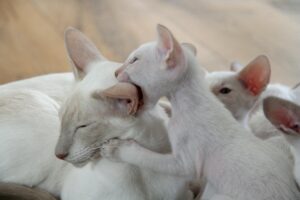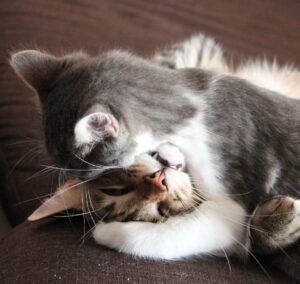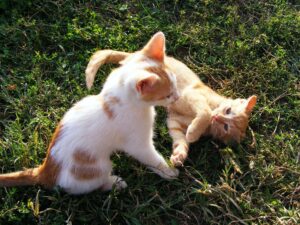Barks Blog
Portland Blog Competition: Redirecting Aggressive Behavior
By Dr. Lynn Bahr

As cat lovers, we’ve all been scratched at least once. But why do some cats play so rough when others never scratch or bite?
Cats, by their very nature, are ferocious hunters. These behaviors are formed when they are very young by instinct, observation and playing with their littermates. Through stalking, chasing, swatting, biting and pouncing on their siblings, kittens develop their precise hunting skills. But when cats are removed from this environment too young or don’t have an adult cat to keep them in line, they might never learn how to play gently. This can cause our pets to play too roughly with each other or attack us when we least expect it. Without adequate outlets to express themselves naturally, cats seek out others to engage in their need to play, hunt, and be physically active.
Feline play aggression is a common complaint among cat lovers, but it doesn’t have to be. If you know what to look for, it’s easy to redirect and retrain your kitty to be a gentle hunter. Keep in mind; your cat’s actions are normal, natural, and instinctual for all felines.

Natural play behavior can vary slightly from one cat to another, but in general, play mimics the hunt. Cats like to stalk, ambush and chase. Once they catch their prey—whether real or fake—they might even kick, bite or scratch. That’s usually what has happened when we humans get a nip or a scratch. We’ve become the “prey.” And if you scurry away, you probably look like you’re playing along.
If your cat is prone to aggressive play, it’s important to understand that punishments won’t work. Yelling at your cat or breaking out the spray bottle could actually make their behavior worse. Even pulling away from an aggressive kitty can trigger their hunting instincts. Stay calm and redirect the behavior. It may take a little time, but with patience, you can keep cats and humans safe and happy.
If your cat likes to play roughly with other cats, make sure it’s consensual on both sides. If either cat is exhibiting body language associated with fear or aggression—such as an arched back, hissing, raised fur, or lowered ears—it’s a good idea to separate the cats until the playful one has a chance to release some of his energy. Try breaking out a wand toy or stuffed kicker toy to distract him.

When a kitten is too rough, mom and the litter mates will let him know with a nip, scratch or hiss. Over time, they learn not to be so rambunctious. But what might be just fine for another cat, could leave a nasty mark on a human. So we might need to teach them how to play with us by redirecting their behavior in more positive ways.
If your cat is prone to biting or scratching you during play, make sure you aren’t encouraging it. Never use your hands as toys. Even a gentle cat may go a bit too far once and a while. Give kitty adequate playthings to keep him entertained. You might even try catnip, silvervine, or other, safe, herbs to encourage the use of toys.
Cats that play too roughly are generally just bored. Playtime is the key to keeping this unwanted behavior in check. When you give your cat lots of opportunity for meaningful, enriching play, their minds and bodies get the activity they need and our scratched up hands and feet get a much-needed break.
*This post is a runner up in our Portland 2019 Writers’ Competition. All winning and runner up entries will be published in the March 2019 issue of BARKS from the Guild . To learn more about canine and feline aggression, join us at the Pet Professional Guild Canine Aggression and Bite Prevention Educational Seminar (with bonus feline specialty track) in Portland, Oregon April 26-28, 2019.*
About the Author
Dr. Lynn Bahr is a 1991 graduate from the University of Georgia, College of Veterinary Medicine. She credits a special grey and white ball of kitten fluff to lead her down the path of a career in feline medicine. Her areas of interest and special care for felines include health and wellness, life-time enrichment, hospice care, strengthening the animal-human bond, ending the practice of declawing, and the ability to speak fluent cat. Dr. Bahr is the CEO of Dezi & Roo , a company that manufactures and sells solution-based pet products. She serves on the Board of Directors of Pandemonium Aviaries, Fear Free Advisory Board, Parliamentarian for the Society of Veterinary Medical Ethics, and the Pet Professional Guild Cat Committee.


